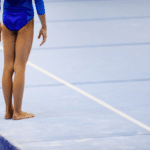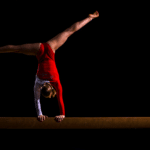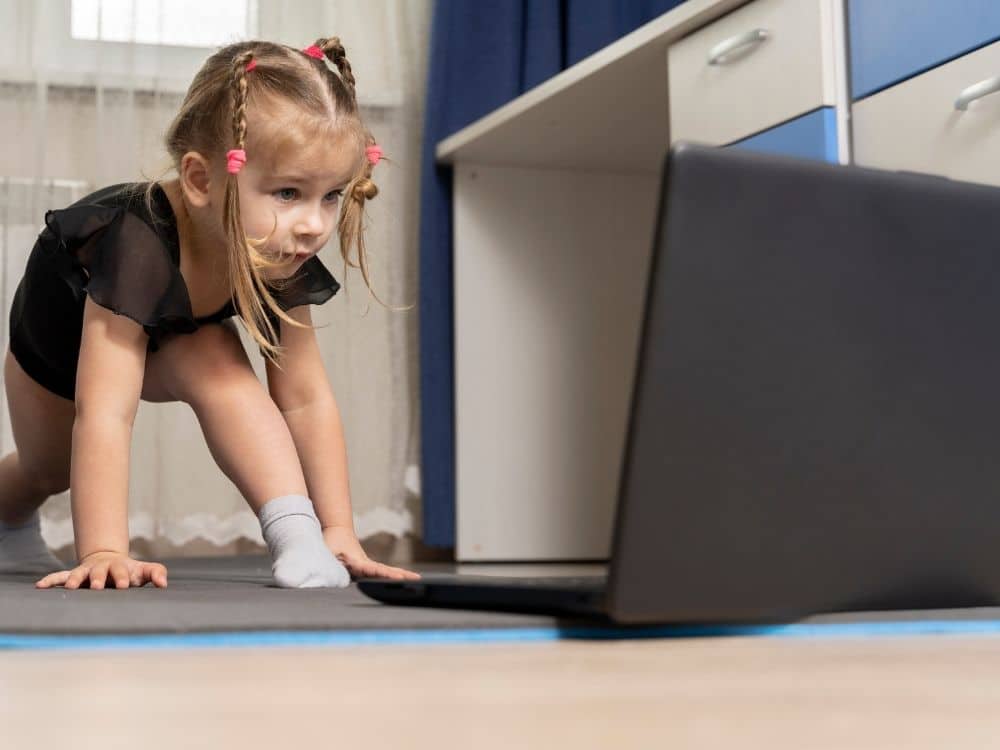
Over the last twenty years as a gymnastics coach I have seen a huge increase in the number of children (and numerous adults) that have taught themselves some element of the sport. How and why has this increase happened and is it a good idea?
Whilst I think it’s great that people want to be physically active and try gymnastics, this is a dangerous sport with a high risk of injury when something goes wrong.
For that reason, I would never recommend anyone to learn gymnastics without getting professional guidance at some point.
Let’s dive into my reasoning in more depth, and suggest the best options for someone wanting to learn gymnastics.
Table of Contents
- What is self taught gymnastics?
- How good can a self-taught gymnast get?
- Is home practice the same as self taught gymnastics?
- Is it OK to be self-taught in gymnastics?
- Are YouTube gymnastics videos trustworthy?
- What is the best way to learn gymnastics?
- Final thoughts
What is self taught gymnastics?
I would describe self-taught gymnasts as those who have had no formal coaching and very little access to a professional gym. Instead, self-taught gymnasts have often found teaching guides and tutorials online and then been inspired to follow along at home, in the backyard or at the park.
This can range from the beginner’s level of rolling, handstands and cartwheels up to more advanced flips and somersaults. There are also plenty of self-taught gymnasts that focus on learning the strength, conditioning and flexibility needed to become a gymnast.
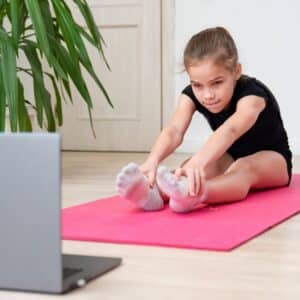
There is plenty of gymnastics training equipment sold online for self-taught gymnasts to use at home. Some of this can help but bear in mind that it rarely matches the size or feel of the real thing.
A completely self-taught gymnast is easy to spot when they train alongside gymnasts that have professional coaching…. and it’s NOT their physical ability that is lacking, as plenty of self-taught gymnasts have great natural strength, speed and flexibility.
Self Taught Gymnast Technique
It’s actually the technique that will often stand out because gymnasts trained by professional coaches will have refined and improved even minor details when learning a skill. This is even true of lower-level (recreational) gymnasts who will have been asked to repeat skills over and over until the coach is satisfied they can move on to a harder skill. There is usually an element of style and flair lacking in self-taught gymnasts as they are often not focused on this side of performing.
This might sound a bit harsh on self-taught gymnasts who can put equal amounts of effort and determination into their training. However, when training without a real coach most self-taught gymnasts will not repeat and drill skills to the same intensity.
For example, people who have taught themselves to flip or flick backward will often throw their heads back as they take off so they can spot the ground behind them earlier. However, a good professional coach will train a gymnast not to do this because they know it will kill their height and distance (this can take months or even years to learn properly). Therefore the head position is the easiest way to spot whether someone has learned to just chuck themselves over.
How good can a self-taught gymnast get?
Whilst there is plenty of good content available online, it is impossible to reach the same standards purely by copying what you see.
You won’t progress to a competitive level (even a really low one) by just being a self-taught gymnast. For some people that won’t be a problem as they might not be interested in competing but if you are serious about trying competitions in your gymnastics career, you will need to take classes at some point. To learn a floor routine or even a trampoline routine at home is impossible because of the space needed and the fact that the equipment will be different once you arrive at a comp.
It’s also impossible to enter a competition without being part of a club or school and having a trained coach with you.
If you are more focused on just teaching yourself as many skills as possible you can still learn some advanced skills yourself (though I would never recommend attempting these without proper guidance). Many of you will have seen videos or actually know someone that has taught themselves:
- Double somersaults
- Round Off, Back Handspring (and linking multiple BHS)
- Aerials
- Splits
If you were performing this level of skill in a professional gym, you would be considered an experienced gymnast and certainly not a beginner so it’s fair to say you can get to a decent level as a self-taught gymnast.
Is home practice the same as self taught gymnastics?
No, home practice refers to gymnasts that take classes but are doing additional practice at home. Sometimes coaches will encourage their gymnasts to do extra work on specific exercises or to improve their conditioning. There are also lots of coaches who discourage their gymnasts from doing home practice as they are worried about practice being done incorrectly which can be worse than not doing it at all.
If your coach has asked you to do home practice Beams are a great place to start!
Is it OK to be self-taught in gymnastics?
Although I recommend not teaching yourself gymnastics, it is still possible to learn some basic shapes and positions safely. For example:
- Gym shapes like Tuck, Pike, Straddle, Star, Stretch
- Landing position
- Front and Back support
- Dish and Arch Shape
- V-Shape
It’s also possible to work on basic flexibility stretches and conditioning at home such as:
- Japana
- Pike Fold
- Press-ups
- V-Sits
If you are familiar with these skills it would prepare a gymnast prior to starting classes for the first time. It will also help physically prepare the body to learn more acrobatic skills like cartwheels and handstands.
Are YouTube gymnastics videos trustworthy?
In my experience, YouTube is the number one platform that budding gymnasts use to teach themselves.
There is some really good quality content out there, but there is also a lot of stuff to avoid. If you are going to search for gymnastics tutorials I would recommend only watching qualified coaches and only trying to follow basic skills.
Recommended Resources
Some trustworthy Gymnastics channels that I’ve come across include:
- Shift Movement Science – Dave Tilley is a former gymnast turned coach and aims a lot of his content at coaches however, there are some great videos on strength, conditioning and flexibility work for gymnasts.
- Nick Ruddock – Nick works at an elite level with many federations around the world. Again a lot of content is aimed at coaches but gymnasts will learn a lot as well.
- British Gymnastics – Published some awesome #GymnastsAtHome Challenges during the lockdown.
- Head Over Heels Gymnastics – Great for recreational level gymnastics like Cartwheels and Handstands.
- Gymnastics Bodies – Created by a USA Junior National Team coach, GB produces simple but effective strength training videos.
- GymTactics – Channel for the gym based in MI, USA. There are some really useful progressions for a range of skills.
- USAMLT – Good content that shows drills on a range of women’s artistic skills.
Additional disclaimer: These recommendations do not replace the need for professional guidance and coaching when learning gymnastics. Complete Gymnastics is not responsible for any injury that occurs if you choose to watch a video and follow along. As mentioned elsewhere in this article, I do not recommend being a completely self-taught gymnast.
Especially avoid trying to teach yourself gymnastics by copying other self-taught gymnasts. Whilst I respect the hard work many of these guys put in, you will not get the same level of support and safety compared with a trained professional coach. Coaches spend many months and years learning drills and coaching methods and how to teach them safely.
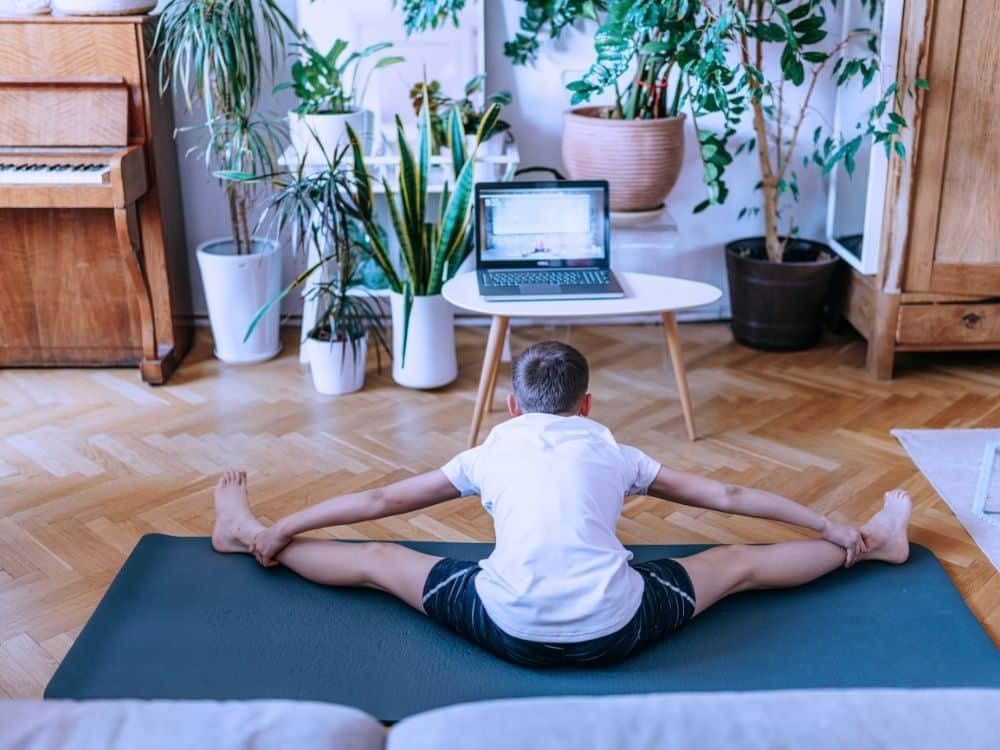
What is the best way to learn gymnastics?
You cannot beat learning gymnastics in a professional gym with qualified coaches.
Gyms differ in setup, coaching philosophy and prices so if you are lucky enough to have multiple gyms near you, it’s worth trying out each one to find a facility that’s right for you.
Online coaching is becoming more popular but still has risks attached. Coaches offer to watch gymnasts train at home via Zoom and give them feedback online. It sounds better than self-taught gymnastics but an online coach won’t be able to spot or catch you and injuries are still a strong possibility.
If you don’t have access to a gym because there isn’t one or it’s too expensive, becoming a self-taught gymnast may seem to be the only option. If you really have no other choice and are desperate to try gymnastics, start with basic shaping and stretches and please do not attempt advanced tumbling skills like flips, even if you think they look easy. A serious injury could occur and leave lasting damage to your body.
Final thoughts
Although I am quite negative in my opinion of self-taught gymnastics, this is because of safety more than anything. I hope that as many people as possible get the opportunity to try gymnastics at some point in their lives but always try and train in a safe and friendly environment with qualified coaches helping you.
Latest Articles:
- 19 Fun Trampoline Games for KidsAre you looking for fun Trampoline Games to keep your kids entertained? Whether you’re hosting a birthday party, a family gathering, or simply looking for… Read more: 19 Fun Trampoline Games for Kids
- Gymnastics Flexibility: The Keys to SuccessFlexibility, sometimes overshadowed by strength and power, is a vital element of gymnastics training. It’s the silent hero that allows gymnasts to glide through air… Read more: Gymnastics Flexibility: The Keys to Success
- What is a Full-In in Gymnastics?One of the most challenging moves in gymnastics is the Full-in. The Full-in is a skill competed on a range of apparatus in Artistic as… Read more: What is a Full-In in Gymnastics?
- 11 Ways To Use Your Gymnastics Air TrackDiscover 11 amazing things you can do on a gymnastics air track and take your skills to the next level! From perfecting your cartwheel to… Read more: 11 Ways To Use Your Gymnastics Air Track
- Essential Gymnastics Bar Exercises (for beginners)Gymnastics is a sport that requires strength, flexibility, and control, and the bar is one of the most important pieces of equipment used to train… Read more: Essential Gymnastics Bar Exercises (for beginners)
- Balance Beam Skills for BeginnersIf you are just starting out in gymnastics you may be wondering what the ideal Balance Beam skills for beginners are. I have put together… Read more: Balance Beam Skills for Beginners



